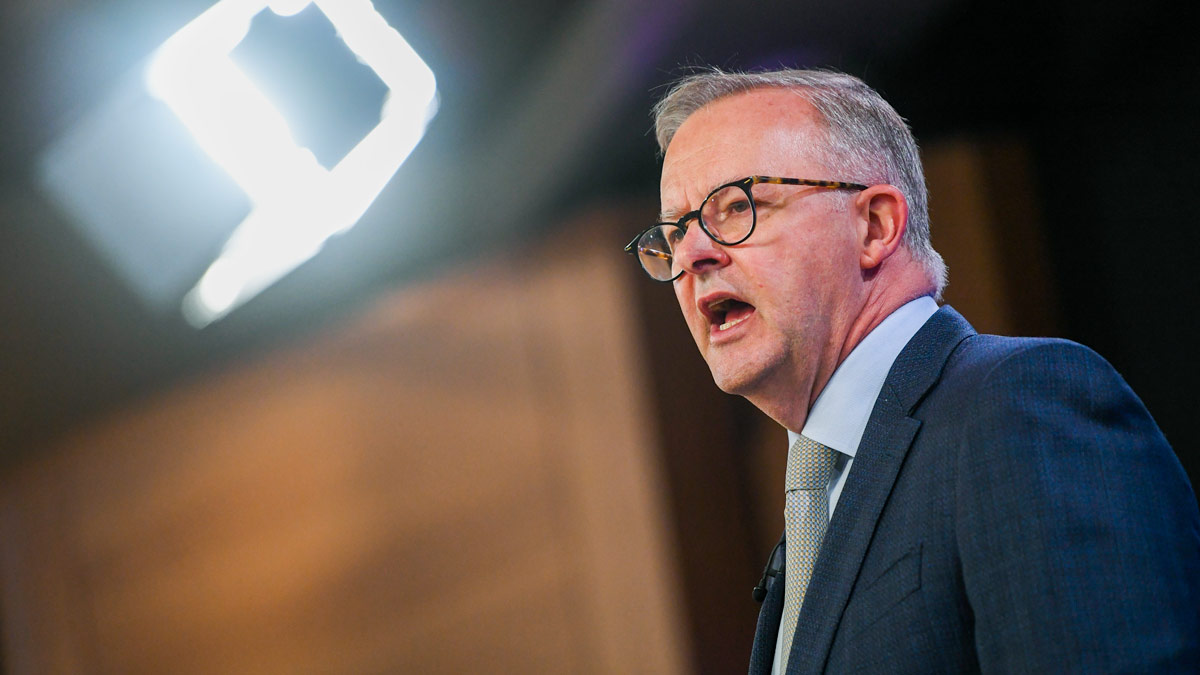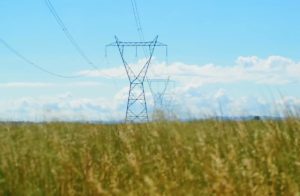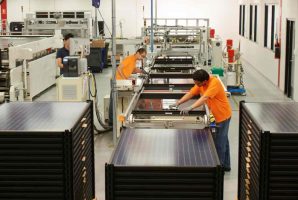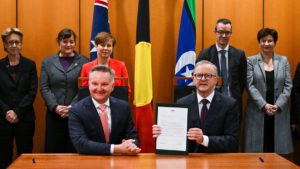Federal Labor leader Anthony Albanese has pitched Labor’s “straightforward” climate policies in his first major speech for the 2022 election year, saying that the Morrison government had failed to deliver on its rhetoric on climate and energy policy.
In an address to the National Press Club on Tuesday, the opposition leader said Labor’s climate policies would deliver the promised reductions in emissions without adopting some of the ‘fine print’ tricks that are a feature of the Morrison government’s climate plan.
“It’s a straightforward plan, and it’s one that will work,” Albanese said.
“It’s been fully modelled, and we put it all out there. Our plan didn’t have a little provision, a little asterisk, which is in their pamphlet of stuff that they’ve made up, and that doesn’t exist yet.”
Albanese referred to the Morrison government’s plan to reach a net zero emissions target by 2050, which relied upon developing future, unspecified, technologies for delivering a significant proportion of required emissions cuts to achieve the target.
When asked about whether Labor would be able to pass new climate legislation through a future parliament, Albanese said that Labor could rely on existing legislation for the Safeguard Mechanism to deliver on its higher emissions reduction targets, but would look to task a revitalised Climate Change Authority with helping to ensure the mechanism could help reach zero net emissions by 2050.
“The legislation for the Safeguards Mechanism is there. It was introduced by Tony Abbott. And Tony Abbott’s legislation provides for provides for the companies that are part of the Safeguard Mechanism,” Albanese said.
“What hasn’t happened is that the Climate Change Authority hasn’t put forward oversight of it, that ensures it’s consistent with net zero by 2050.”
Anticipating a potential line of attack on Labor’s climate policies, Albanese confirmed that the coverage of the Safeguard Mechanism would not be expanded to include additional industries or emitters, limiting it to the companies already covered by the mechanism.
“We think that the current industries, which are there, provide certainty going forward. There isn’t a single business that is currently not covered by the Safeguard Mechanism that will be covered,” Albanese said.
Albanese also reiterated that Labor’s policy package, announced late last year, had not been designed to accelerate the closure of coal fired power stations, many of which are already reaching the end of their operating life.
Reflecting on the experience of the Liddell coal fired power station, expected to close next year, Albanese said that the Morrison government had come to accept the reality of the ageing power station’s closure, despite attempts by previous Coalition governments to try and prevent Liddell from closing.
“They talked about it, and then they did the opposite,” Albanese said. “And that’s consistent with what they’ve done the whole way through because they got hit by reality and the market. So Liddell will shut because of the problems that are there because it’s at the end of its life.”
“If you speak to people in the energy sector, including the head of energy security appointed by this government, Kerry Schott, [they] will tell you why Liddell couldn’t have been kept open.”
“Josh Frydenberg used to stand up in question time, day after day and give speeches about Liddell. And he doesn’t talk about it anymore.”
The Labor opposition outlined its latest climate change policy package just before Christmas, which it will take to a federal election scheduled for the first half of this year.
Labor’s climate policy includes a commitment to a 43 per cent emissions reduction target for 2030 and a commitment to zero net emissions by 2050, which will primarily be driven by a massive switch to renewable energy sources. It assumes a grid with an 82 per cent renewables share by 2030.
The package has been seen as a softening of the more ambitious policies Labor unsuccessfully took to the 2019 federal election, even while delivering deeper reductions in emissions, and a quicker transition to renewables, than is being targeted by the Morrison government.
Albanese highlighted the support from business groups that Labor’s new policy had received, including groups that had attacked Labor’s policies taken to the last election.
“I reckon if I had have stood up here… and said, ‘What we’re going to do is, I’m going to have a plan, and it’ll be endorsed by the ACTU, it will be endorsed by mainstream conservation groups, it will be endorsed by the Business Council, ACCI, AIG and the National Farmers Federation’, I would have been laughed out,” Albanese said.
“Well, we did it. We did it. And we did it fully costed.”










